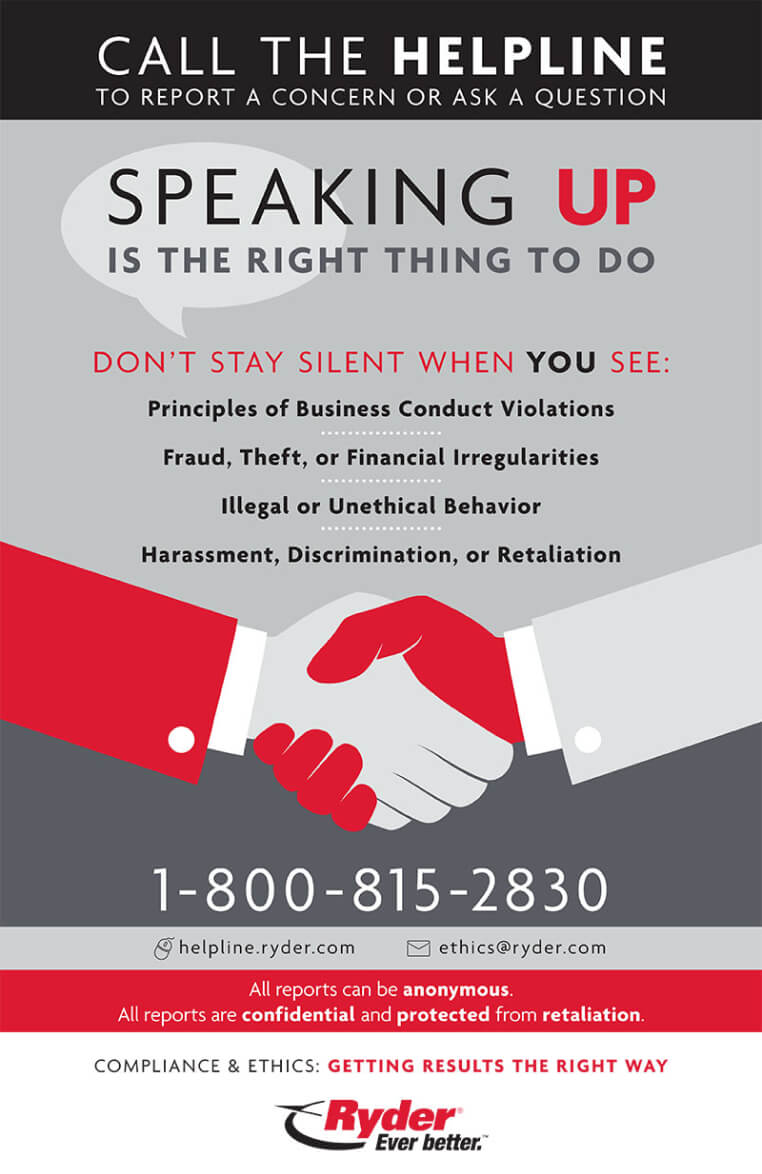EMBODYING A FAIR, HONEST, AND ETHICAL CULTURE
CORPORATE CULTURE
Ethics and Integrity represent the foundation of our company and the lens through which we scrutinize every decision, big or small. Ryder has a responsibility to our stakeholders, employees, customers, and the communities we serve to conduct our business according to the highest ethical standards. These standards are integrated into our daily operations and come from the very top. Our CEO, Robert Sanchez, sets both the expectation and the example of how our business should operate, which cascades down through our management team to each and every employee. Our culture of integrity permeates all aspects of our business. Our employees adhere to strict Principles of Business Conduct (POBC) that set us apart as a trusted, ethical, and responsible enterprise. Built around our four Leadership Competencies of Character, Judgement, Relationships, and Results, our POBC help ensure that employees conduct our business fairly, honestly, and ethically.
We have developed a Supplier Code of Conduct to complement our POBC and clarify our expectations in this area. We are committed to respecting human rights and upholding laws that prohibit child labor and human trafficking. All of our business partners, suppliers, vendors, and other entities are expected to implement policies and procedures to ensure there is no engagement in or support of forced labor or unlawful child labor. In addition to protecting human rights and enforcing fair working conditions, our suppliers must comply with all laws and regulations that prohibit bribery, corruption, and other unethical practices.
As part of our sustainability goal-setting and strategy direction in 2020, we defined two goals to support our culture of ethical conduct:
• Ensure 100% of employees complete a compliance and ethics training each year.
• Ensure 100% of employees review and agree to abide by our POBC.
Managing Ethics
Ryder’s Compliance & Ethics Department, headed by our Chief Compliance Officer (CCO), oversees the framework by which we manage the legal, regulatory, compliance, and ethical challenges of our business. The CCO reports to the Chief Legal Officer and regularly reports to the Leadership Team, Audit Committee, and Board of Directors on various compliance and ethics initiatives, including our anti-bribery and anti-corruption programs, Helpline statistics, Enterprise Risk Management, and any compliance-related issues or trends that could impact the company.
Policy Management System
Our Policy Management System houses our robust set of corporate policies in one location for employees to easily locate and review at any time. Embedded in the system for each policy is a designated policy owner, an indication of when the policy was last updated, and when it would next be reviewed. Our Policy Management System also enables us to easily communicate mandatory policies to employees and track attestations of review.
Our Policy Management System is available via mobile app to ensure accessibility for our field employees and those with limited computer access, such as drivers, technicians, and warehouse employees. Currently, the Ryder Policy Management System is available to all United States, Canada, and Mexico employees.

Employee Training on the Principles of Business Conduct
Circulated across the whole company, our comprehensive POBC apply to our officers, employees, and Board members and cover all areas of professional conduct. Topics include but are not limited to: mechanisms to report known or suspected wrongdoing; bribery and corruption; compliance with law; safety, health, and the environment; conflicts of interest; gifts and entertainment; social media use; and contributing to a respectful workplace. Available in multiple languages, the POBC forms the playbook that keeps Ryder on the right track so that we can maintain our reputation for ethical conduct.
The ethical standards laid out in the POBC are foundational to employee development at Ryder. During—and often before—the new hire onboarding process, we introduce and train all new employees on the POBC and how to report conflicts of interest. We provide online ethics and compliance training to all salaried employees three times per year, and once a year for all hourly employees. Our POBC training covered 99.9% of employees in 2019.
To ensure we maintain a culture of ethics, we also provide targeted in-person training and webinars that cover numerous topics, such as Tone at the Top, reporting on concerns, and ethical leadership.
Reporting on Concerns
In the event that an employee has a compliance or ethics concern, we maintain multiple channels and departments for communicating concerns, as outlined in the POBC on pages five and six. These reporting mechanisms include the Helpline, which is hosted by a third-party and managed by our Compliance & Ethics Department. The Helpline is available 24/7 to all global employees in multiple languages and employees can report any issues anonymously. The Helpline third-party provider processes, synthesizes, and sends complaints to Ryder via a case management system. The Compliance & Ethics Department reviews all concerns and assigns an investigator based on the nature of the allegations. Various internal departments may be involved in investigating concerns, such as safety and security, internal audit, human resources, legal, compliance, and ethics. Ryder maintains an established protocol for training investigators and setting guidelines on how to conduct an investigation.
In 2019 and 2020, the Compliance & Ethics Department received 801 and 904 reports, respectively, from various sources, including the Helpline, that alleged wrongdoing. This shows that employees are engaged and trust the Helpline. In 100% of cases where an allegation is substantiated, a remedial action is taken, ranging from warnings to termination of employment.

CLEAR SIGNALS
On our internal communications platform, we also publish a periodic column titled “Clear Signals – Actual Stories of People Who Did the Right Thing,” in which we detail compliance issues that have come up at Ryder, how the issues were resolved, and best practices employees can use when faced with an ethical quandary or decision. All potential, identifying information of the people involved in these stories is scrubbed, and employees are reminded of how they can anonymously report any ethics concerns.
